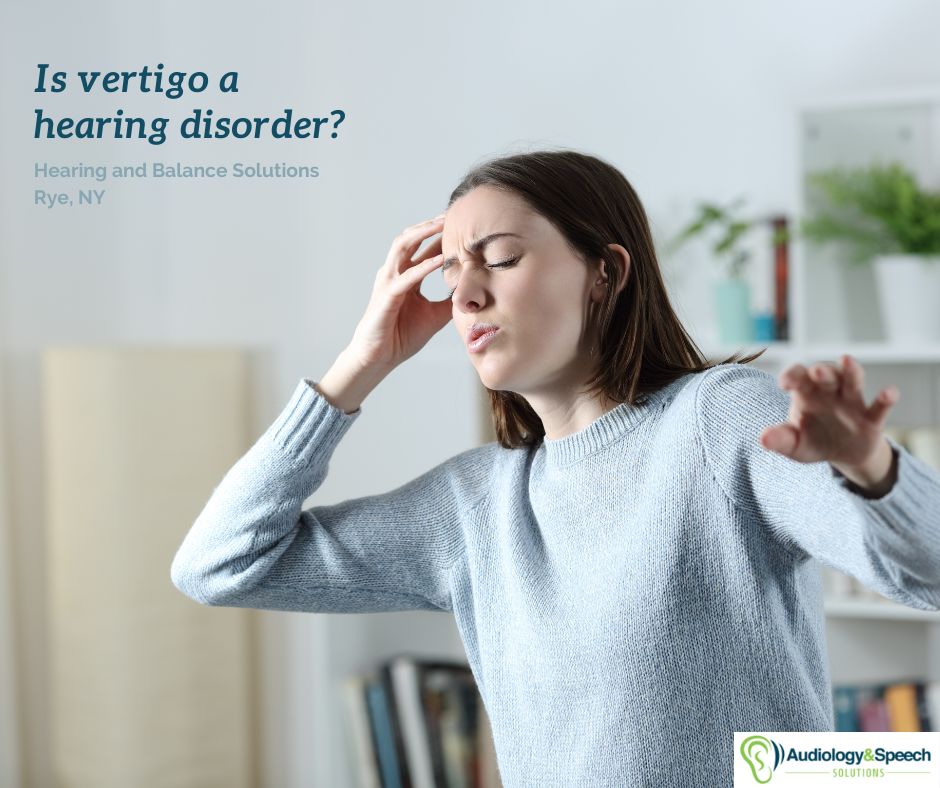Vertigo and hearing loss are commonly linked with each other due to their shared underlying cause: inner ear dysfunction.
The inner ear consists of the vestibular system and the auditory system. These two systems work together to process sound and maintain balance. Any damage or disruption to the inner ear can result in either hearing loss or vertigo. In some instances, the damage could lead to hearing loss and vertigo.
Understanding the connection between hearing disorders and vertigo
Vestibular nerve disorders and inner ear disorders cause vertigo and hearing loss.
Hearing loss can affect spatial orientation while vertigo can affect hearing by triggering tinnitus or pressure in the ears.
How can vertigo affect the quality of life?
Vertigo can significantly affect an individual’s quality of life, especially if the vertigo is chronic or severe. Vertigo attacks can make it especially difficult to perform normal tasks and daily activities, such as walking, driving, or going up and down the stairs.
Untreated vertigo can significantly affect an individual’s physical and emotional well-being. For example, severe vertigo can cause vomiting, nausea, and possible loss of consciousness. A person with vertigo is always on the lookout for when the next “attack” would take place, making it difficult to focus on just relaxing and enjoying life. This could lead to social withdrawal or avoidance of being in public for fear of experiencing a vertigo attack.
Early diagnosis leads to appropriate treatment to manage the symptoms of vertigo and prevent complications. Seeking the advice of an audiologist or a specialist is the first step in addressing vertigo symptoms.
Through proper diagnosis and treatment, it is possible to live normally and enjoy life without worrying about the next vertigo attack.
Vertigo attacks
Episodes of vertigo vary in duration and intensity. Loss of balance or dizziness may be experienced before, during, or after vertigo attacks.
Untreated vertigo may lead to progressive tinnitus and hearing loss. Some ear disorders, such as Meniere’s disease, are closely linked to vertigo and may cause hearing loss. A person diagnosed with Meniere’s disease may be diagnosed with vertigo.
When to consult an audiologist
Audiologists are trained and knowledgeable in diagnosing and treating hearing and balancing disorders. Consulting an audiologist for vertigo is a good idea since the vestibular system is located in the inner ear, which is part of their scope of expertise.
Diagnosing vertigo
Diagnosing vertigo primarily begins with a comprehensive evaluation of medical history and symptoms. Hearing and balance tests will then be performed as needed. If there is a need for further testing, blood tests and imaging studies may be recommended.
What is auditory vertigo?
Also known as recurrent aural vertigo, auditory vertigo refers to Meniere’s disease. Studies* have shown that 20 to 60% of patients experience sudden hearing loss because of vertigo. A person diagnosed with Meniere’s disease may experience symptoms of vertigo along with loss of hearing and/or tinnitus.
Aside from the loss of hearing, auditory vertigo may manifest symptoms of vertigo, nausea, vomiting, dizziness, and abnormal eye movements.
Treatment options for vertigo
Vertigo treatment options will depend on the underlying causes and severity of symptoms.
Vestibular rehabilitation therapy (VRT) and medications can help relieve vertigo symptoms. For vertigo patients diagnosed with hearing loss, using hearing aids has been shown to help improve balance and alleviate vertigo symptoms.
Keep in mind that addressing vertigo symptoms does not guarantee to cure the underlying condition entirely. However, managing the symptoms can help improve the patient’s quality of life.
It is critical to work closely with specialists or healthcare providers to determine the best course of treatment for individual needs.
Audiologists in Rye, NY
Are you experiencing symptoms of vertigo or hearing loss and need to consult with an audiologist?
Schedule an appointment with one of the best audiologists in Rye, NY, at Audiology and Speech Solutions.
We look forward to seeing you at our clinic!
*Rambold H and others. differential vestibular dysfunction in sudden unilateral hearing loss. Neurology 2005:64:148-51

